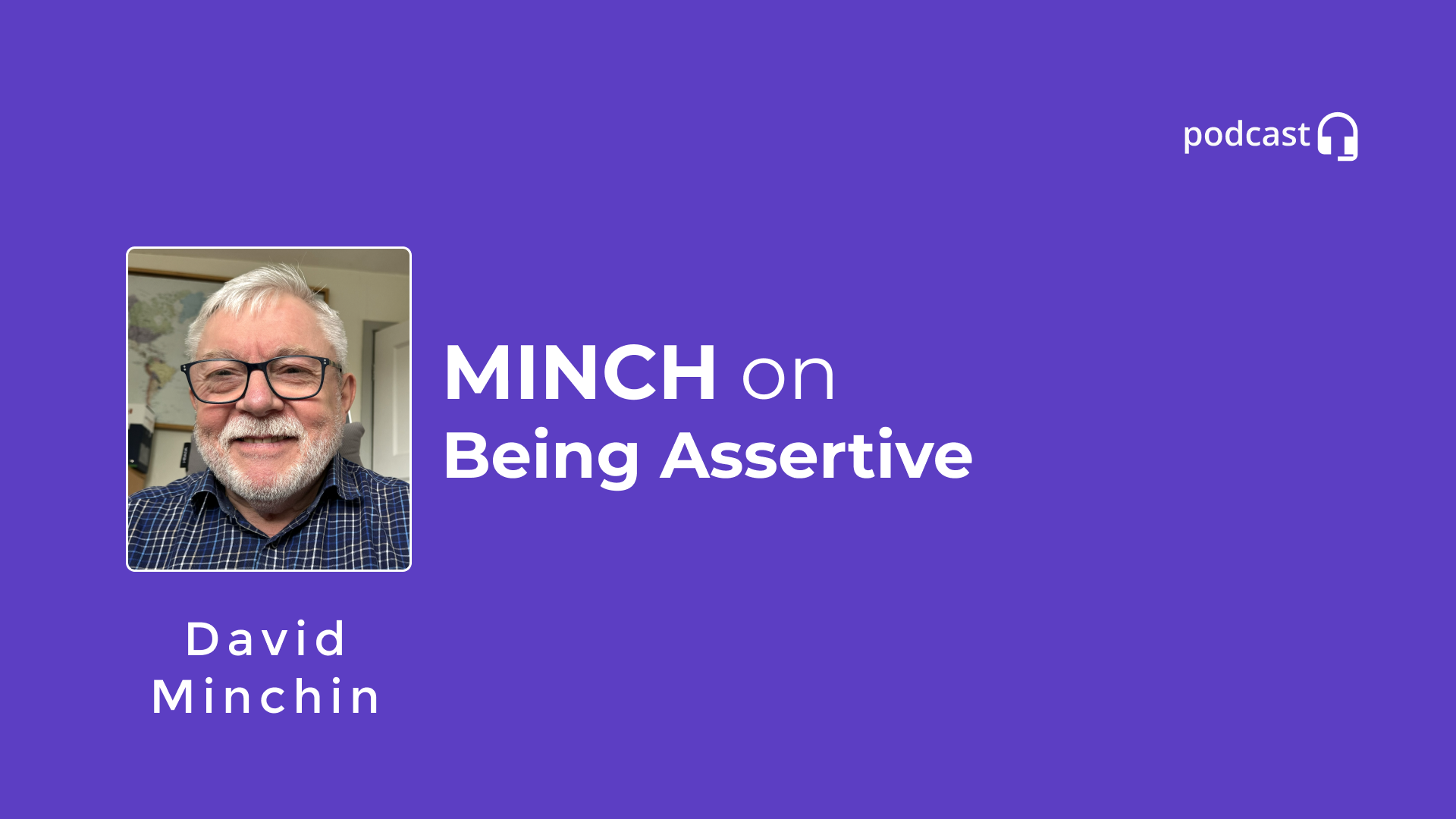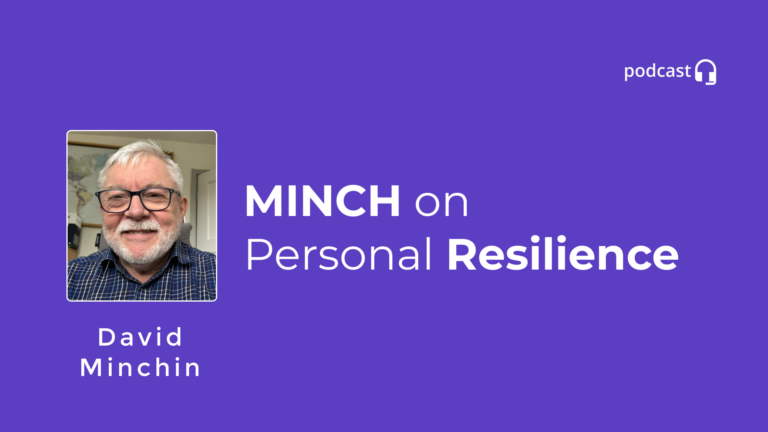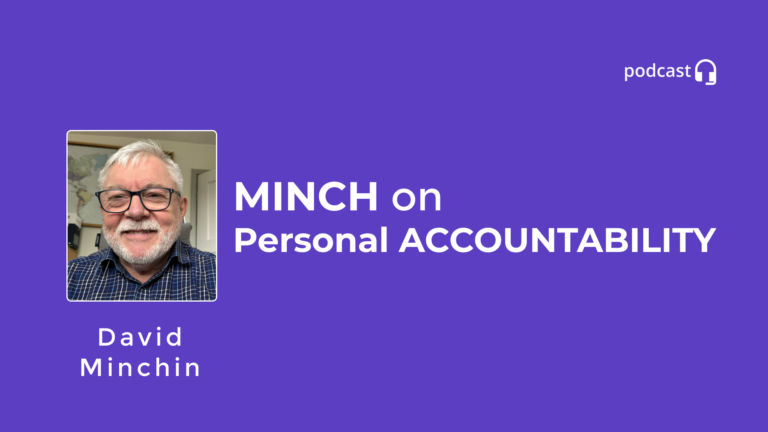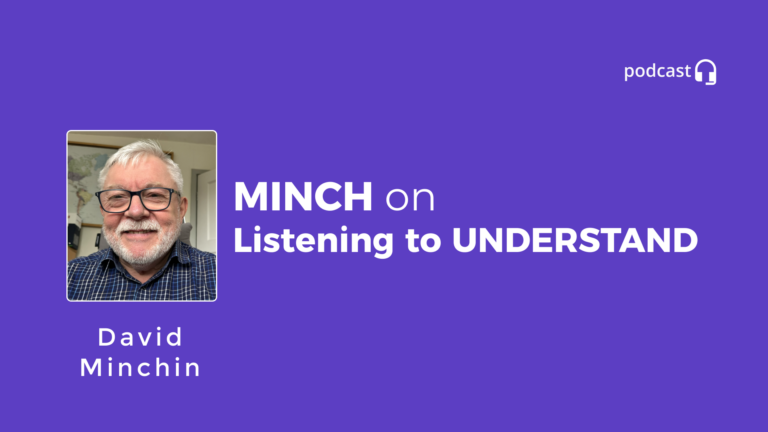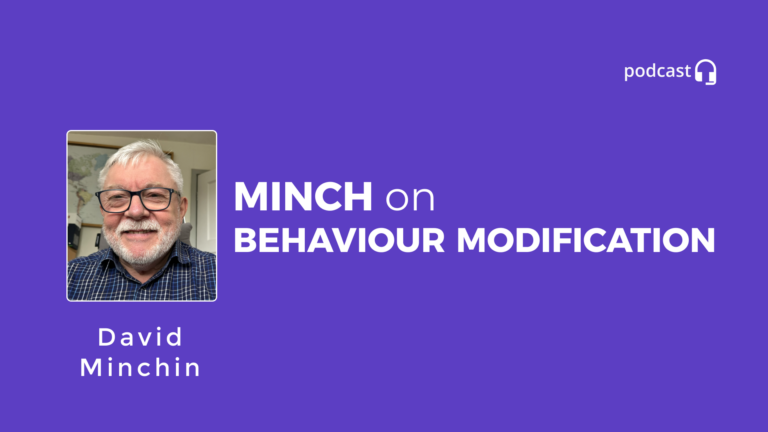MINCH on … Being Assertive
by David Minchin
This article MINCH on Being Assertive gives the background to developing some techniques demonstrating assertiveness.
There are a lot of ‘schools of thought’ about assertiveness so this article explores various aspects of being assertive, submissive and aggressive.
It is likely that in the course of our work with people, we will face several tricky situations from time to time …such as the following examples:
- An unreasonable request from the boss.
- Lack of cooperation from another department or a supplier.
- Having to convey an unpopular decision.
- Disagreeing with a view that a more senior person is forcefully expressing.
- Pacifying an irate client without making promises that are difficult to keep.
These situations, and many others like them, are tricky because our needs conflict with the needs of other people. Conflict situations are made worse or better depending on how you handle them.
Broadly we have three choices … you can either be
Assertive, Submissive or Aggressive.
Assertive Behaviour
Involves standing up for our rights in such a way that we do not violate the rights of the other person. We express thoughts, feelings, and beliefs in direct, honest and appropriate ways.
For example, if we are faced with an unreasonable request from our boss about work.
An assertive response might be “I appreciate that you would like this work completed by the end of the month. However, I don’t see how we can fit it in with our present workload. Can we take a look at what alternatives are available?”
So, assertiveness is based on the beliefs that we have needs to be met and others have needs to be met. We have something to contribute, others have something to contribute. It is characterised by statements that value ourselves and also value others.
Submissive Behaviour
We are being submissive when we:
- Fail to stand up for our rights or do so in such a way that others can easily disregard them.
- Express our thoughts, feelings, and beliefs in an apologetic way.
- Fail to express honest thoughts, feelings, or beliefs.
For example, again we are faced with an unreasonable request from our boss about work.
A submissive response might be “Well I don’t have any spare time, really, but I suppose I could work late to fit the extra work in, er … I don’t mind”
So submission is based on the belief that our own needs and wants are less important than those of other people. It is characterised by long, justifying explanations, often putting ourselves down whilst accommodating others.
Aggressive Behaviour
We are being aggressive when we:
- Stand up for our rights in such a way that we violate the rights of another person.
- Express thoughts, feelings, and beliefs that may be honest or dishonest, but do it in inappropriate ways.
For example, yet again we are faced with an unreasonable request from our boss about work.
An aggressive response might be “Hell! Listen, I’m up to my ears in work already. There’s no way we can do that. You’ll have to find somebody else!”
So, aggression enhances ourselves at other people’s expense; it puts the other person down. It is based on the belief that our opinions are more important than other people’s. It is characterised by blaming other people, blaming outside factors, showing contempt, and being hostile / attacking or by being patronising.
What are the advantages of assertive behaviour?
- Since assertion tends to breed assertion, people are more likely to work with us rather than against us. Hence we are more likely to achieve our objectives in tricky conflict situations.
- Greater confidence in ourselves. We have a positive regard for ourselves as opposed to boastfulness of (aggression) or hopelessness of (submission).
- Greater confidence in others. We have a healthy recognition of other’s abilities and limitations as opposed to seeing them as ‘inferior’ to our own from an aggressive standpoint or as ‘superior’ to our own obviously from a submissive point of view.
- Increased self-responsibility.
We take responsibility for ourselves, our opinions, our wants, and our needs, rather than blaming ourselves ‘I’m sorry, I made a dreadful mess of it’ (submission ) or blaming other people ‘It’s all your fault this has happened’ (aggression) - Increased self-control
We can channel our thoughts and feelings to produce the behaviour we want rather than being controlled by events, by others or by our feelings.
- A saving in time and energy.
Because we are no longer pre-occupied with not upsetting people (submission) nor are we so concerned about losing out (aggression) we save ourselves an enormous amount of nervous energy allowing time to make decisions more swiftly based on their merit and save even more time dealing with less disputes and conflict.
There is a lot more to talk about regarding assertiveness in future articles. Being Assertive 2 and Being Assertive 3 which will include ‘how to deal with different situations assertively.
These articles are partnered with my MINCH on Podcast episodes.

